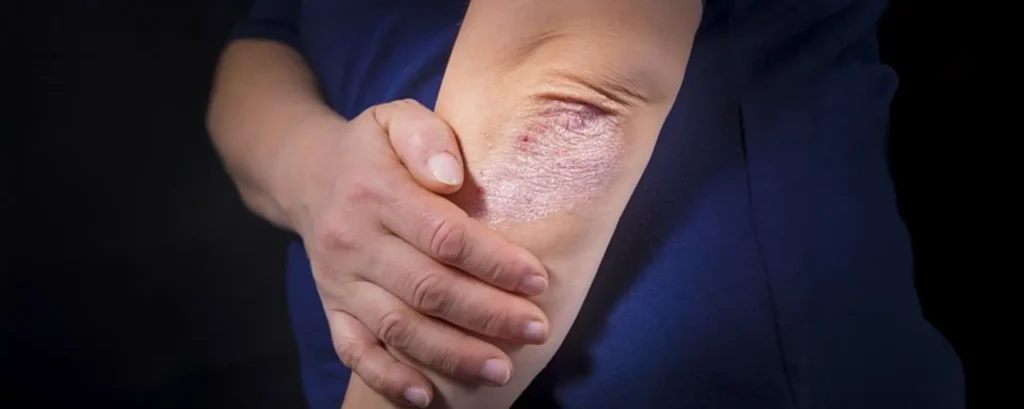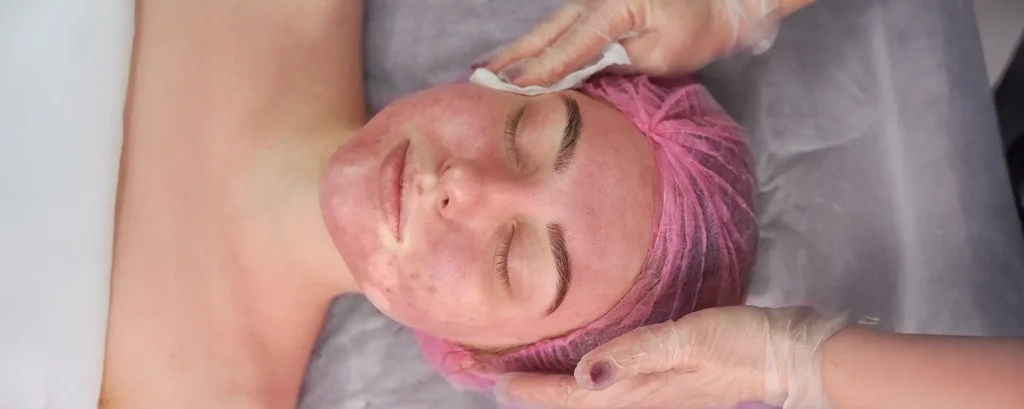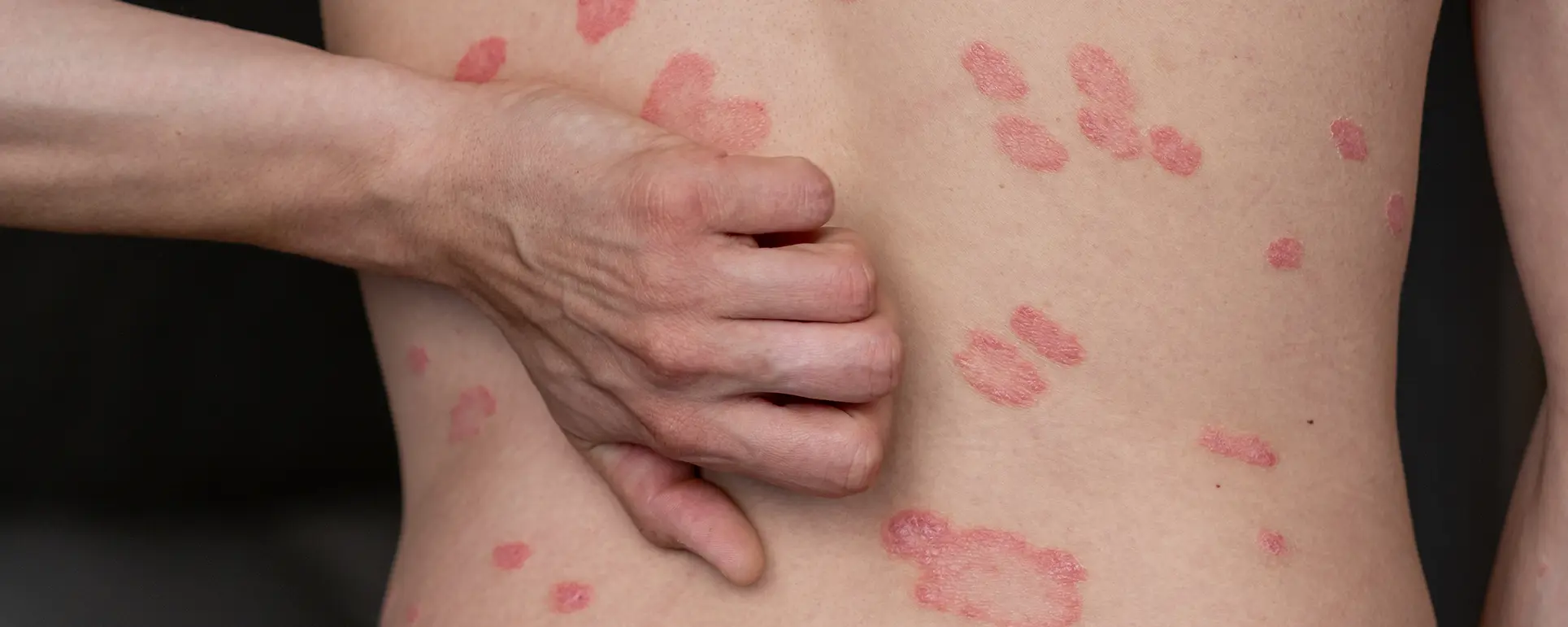If you live with psoriasis, you probably already know just how frustrating flare-ups can be. One week, your skin feels relatively manageable you might even forget it’s there and the next, suddenly, you’re faced with red, itchy, scaly patches that make even simple daily tasks uncomfortable. Flare-ups often appear out of nowhere, and they can affect not only how your skin feels but also your confidence. It’s completely normal to feel frustrated, and it’s important to remember that you’re not alone in dealing with these unpredictable episodes.
So, you might be wondering, how can you calm a psoriasis flare-up quickly? The truth is, there’s no magic overnight cure that will make flare-ups disappear instantly. However, there are plenty of practical steps you can take to soothe your skin, reduce irritation, and prevent flare-ups from becoming worse. By knowing how to care for your skin during a flare-up, you can regain some control over your symptoms and feel more comfortable in your own skin.
In this guide, I’m going to walk you through effective skincare routines that are gentle on your skin, lifestyle adjustments that can make a real difference, and treatment options that can help calm flare-ups before they spiral out of control. I’ll also share guidance on recognising when it’s time to see a dermatologist or other specialist so you can get personalised support tailored specifically to you.
By following these strategies, you’ll not only be able to manage flare-ups more effectively but also empower yourself with knowledge on how to reduce their frequency over time. Remember, managing psoriasis is a journey, and with the right approach, you can keep flare-ups from taking over your life.
What Happens During a Psoriasis Flare-Up?

If you have psoriasis, you might have noticed that your skin doesn’t behave like everyone else’s. That’s because psoriasis is an autoimmune condition, which means your immune system is a little overzealous. Normally, your skin cells take about 28 days to renew themselves, quietly shedding and replacing old cells. But with psoriasis, this process speeds up dramatically you’re talking just 3 to 7 days.
When this happens, skin cells don’t have time to shed naturally. Instead, they pile up on the surface, forming the red, scaly, itchy patches known as plaques. These flare-ups can be uncomfortable, embarrassing, and sometimes even painful, and they often appear suddenly, leaving you wondering what triggered them this time.
Flare-ups happen when your immune system becomes overactive, and the reasons can vary from person to person. For you, it might be stress, illness, changes in the weather, certain medications, or even lifestyle factors like diet and alcohol consumption. Understanding what sets off your flare-ups is one of the most powerful steps you can take in calming them quickly.
Common Triggers of Psoriasis Flare-Ups
You might already know some of your triggers, but others may surprise you. The most common ones include:
- Stress: High stress levels can disrupt your immune system.
- Infections: Sore throats, colds, and other infections often trigger flare-ups.
- Weather changes: Cold, dry weather is especially harsh on the skin.
- Skin trauma: Cuts, scrapes, or even sunburn can worsen psoriasis.
- Alcohol and smoking: Both are known to increase flare frequency.
- Certain medications: Beta-blockers, lithium, and antimalarials can aggravate psoriasis.
- Hormonal changes: Puberty, pregnancy, or menopause may affect symptoms.
By recognising your own triggers, you can take proactive steps to avoid them whenever possible.
Immediate Steps to Calm a Psoriasis Flare-Up

When a flare-up hits, it can feel overwhelming, but there are practical steps you can take right away to ease discomfort and help your skin recover more quickly. These actions won’t cure psoriasis overnight, but they can make a real difference in how your skin feels and how your flare-up progresses.
Keep Your Skin Moisturised
Moisturising isn’t just about comfort it’s an essential part of managing flare-ups. When your skin is dry, plaques can become more inflamed and itchy. Using thick creams or ointments rather than lighter lotions helps lock in hydration and protect your skin barrier. Make it a habit to apply moisturiser several times a day, especially after bathing, so your skin stays soft and less prone to cracking.
Take Lukewarm Baths
A warm, soothing bath can work wonders for calming flare-ups. Lukewarm water helps soften thick scales and reduces itching without stripping your skin of its natural oils. You can add bath oils, colloidal oatmeal, or Epsom salts for extra relief. Try to avoid hot water it may feel relaxing initially, but it can dry out your skin and worsen irritation.
Use Medicated Creams
Depending on the severity of your flare-up, medicated creams can provide targeted relief. Over-the-counter options containing salicylic acid or coal tar can help reduce scaling, while prescription topical steroids are sometimes recommended for short-term flare-up control.
Avoid Scratching
It’s easier said than done, but try to resist scratching your plaques. Scratching may bring momentary relief, but it can lead to bleeding, infections, and further irritation, making flare-ups worse. Instead, try tapping, pressing gently, or using a cool compress on itchy areas.
Wear Comfortable Clothing
What you wear can impact how your skin feels during a flare-up. Loose, soft fabrics like cotton are gentle on your plaques and reduce friction that can aggravate your skin. Avoid rough, tight, or synthetic fabrics that can rub against your skin and trigger more irritation.
Building a Skincare Routine for Psoriasis
Creating a consistent skincare routine can make a noticeable difference when it comes to calming flare-ups and preventing new ones from appearing. Think of it as giving your skin daily support and protection something that helps you feel more in control and comfortable.
- Cleanse gently: When you wash your skin, choose mild, fragrance-free cleansers that won’t strip away natural oils. Avoid harsh soaps or products with strong chemicals, as these can irritate your skin and trigger flare-ups.
- Moisturise regularly: Moisturising is one of the most important steps in managing psoriasis. Apply thick creams or emollients within minutes of bathing to lock in hydration. Don’t be shy about applying moisturiser multiple times a day, especially to areas that tend to flare.
- Exfoliate carefully: Gentle exfoliation can help remove dead skin cells and reduce scaling, but be careful not to overdo it. Avoid harsh scrubs or vigorous rubbing, which can worsen inflammation.
- Sun protection: Moderate sunlight can be beneficial for psoriasis, as UV light can slow down skin cell turnover. But too much sun can increase the risk of burns and potentially trigger new flare-ups.
Lifestyle Adjustments to Reduce Flare-Ups
The truth is, your daily habits play a huge role in how often flare-ups appear and how severe they feel.
Stress Management
Stress is one of the most common triggers for psoriasis flare-ups. When your body is stressed, your immune system can become overactive, which may worsen your symptoms. Finding ways to relax isn’t just good for your mind it can directly benefit your skin.
Healthy Diet
While no single diet will cure psoriasis, what you eat can influence inflammation and skin health. Focusing on anti-inflammatory foods may help reduce flare-ups over time. Consider including:
- Omega-3 rich foods like salmon, sardines, walnuts, and flaxseeds.
- Fruits and vegetables high in antioxidants, such as berries, leafy greens, and peppers.
- Whole grains instead of refined carbs, which help stabilise blood sugar and may lower inflammation.
Regular Exercise
Exercise isn’t just about keeping fit it also helps manage stress and supports a healthy immune system. Low-impact activities, like swimming, walking, cycling, or gentle yoga, are ideal if you have sensitive skin or plaques that might get irritated by friction.
Good Sleep
Sleep and skin health are closely linked. When you don’t get enough rest, your body produces more stress hormones, which can trigger inflammation and worsen flare-ups. Aim for 7–9 hours of quality sleep each night, and try to maintain a consistent sleep schedule.
Medical Treatments for Severe Flare-Ups
If over-the-counter methods aren’t enough, medical treatments can help manage flare-ups more effectively.
- Topical steroids: Reduce inflammation and itching during flare-ups.
- Vitamin D analogues: Help slow skin cell growth.
- Phototherapy: Controlled exposure to UV light reduces plaques.
- Systemic medications: For moderate to severe cases, tablets or injections target the immune system directly.
Your dermatologist will recommend the most appropriate treatment depending on the severity of your psoriasis.
Natural Remedies and Home Support
Some people find additional relief with natural remedies, though these shouldn’t replace medical care. Options include:
- Aloe vera gel: Soothes itching and reduces redness.
- Apple cider vinegar (diluted): Helps calm scalp psoriasis.
- Omega-3 supplements: Support anti-inflammatory processes.
- Turmeric: Has natural anti-inflammatory properties.
Always test on a small area first, as natural doesn’t always mean risk-free.
When to Seek Medical Help
While mild flare-ups can often be managed at home, there are times you need professional support:
- If flare-ups are becoming more frequent or severe.
- If plaques cover large areas of your body.
- If joint pain suggests psoriatic arthritis.
- If your mental health is affected by the condition.
In these cases, visiting a dermatologist is the best step forward. If you’re looking for personalised care, visiting a trusted Psoriasis Clinic in London can help you find tailored solutions and long-term management strategies.
Living with Psoriasis: Emotional Impact
Psoriasis isn’t just a skin condition it can affect your confidence, mood, and overall emotional well-being. When flare-ups appear, it’s completely normal to feel self-conscious or even frustrated, especially if your skin is visible or uncomfortable. You might find yourself avoiding social situations, covering up, or worrying about what others think. These feelings are valid, and it’s important to acknowledge them rather than ignore them.
Remember, you’re not alone in experiencing the emotional side of psoriasis. Connecting with others who understand what you’re going through can make a real difference. Support groups, online communities, or in-person meetups can provide a safe space to share experiences, tips, and encouragement.
Counselling or speaking to a therapist can also help you manage the stress, anxiety, or low mood that sometimes comes with living with a chronic condition. Even open conversations with family or friends can offer comfort and reassurance they may not fully understand your experience, but simply having someone listen can help lighten the emotional load.
Managing the mental side of psoriasis is just as important as caring for your skin. Stress itself can trigger flare-ups, so taking steps to look after your emotional health can actually have a positive effect on your physical symptoms too. By combining emotional support with practical skincare and lifestyle adjustments, you can feel more in control and improve your quality of life, even on difficult days.
FAQs About Calming Psoriasis Flare-Ups:
1. What exactly causes a psoriasis flare-up?
Psoriasis flare-ups happen when your immune system becomes overactive and speeds up skin cell turnover. Normally, skin cells renew over about 28 days, but during a flare-up, this process can happen in just 3–7 days. This rapid buildup of cells creates the red, itchy, scaly plaques you notice. Flare-ups can be triggered by stress, infections, medications, weather changes, or even lifestyle factors like diet and alcohol consumption.
2. How can I quickly relieve itching during a flare-up?
Itching is one of the most uncomfortable symptoms of psoriasis. To soothe it, keep your skin well-moisturised, use lukewarm baths with oatmeal or bath oils, and avoid scratching. If itching is severe, a cool compress or gentle tapping can help. Medicated creams prescribed by a dermatologist may also provide targeted relief.
3. Are over-the-counter creams effective for flare-ups?
Yes, some over-the-counter creams can help manage mild flare-ups. Products containing salicylic acid or coal tar help reduce scaling, while moisturisers lock in hydration and protect your skin barrier. For more severe symptoms, your dermatologist may recommend prescription topical treatments like corticosteroids or vitamin D analogues.
4. Can diet really affect my psoriasis flare-ups?
While no diet can cure psoriasis, certain foods may help reduce inflammation and improve skin health. Omega-3 fatty acids from salmon, sardines, or flaxseeds, antioxidant-rich fruits and vegetables, and whole grains are generally beneficial. Reducing processed foods, sugar, and alcohol may also help lower flare frequency. Keeping a food diary can help you spot personal triggers.
5. How does stress impact psoriasis?
Stress is a major trigger for many people with psoriasis. When you’re stressed, your immune system can overreact, worsening inflammation and triggering flare-ups. Managing stress through yoga, meditation, deep breathing, or counselling can help reduce the frequency and severity of flare-ups while improving your overall well-being.
6. Is sunlight helpful or harmful for psoriasis?
Moderate sunlight can be beneficial because UV light slows skin cell growth. However, too much sun can burn your skin and trigger new flare-ups. Always protect exposed skin with sunscreen if you plan to spend time outside, and consult your dermatologist about safe sun exposure.
7. Can exercise make flare-ups worse?
Exercise generally benefits psoriasis by reducing stress and supporting your immune system. Low-impact activities like walking, swimming, cycling, or yoga are ideal, especially if your plaques are sensitive. Avoid activities that cause excessive friction or sweating on affected areas, which can aggravate your skin.
8. When should I see a dermatologist?
You should seek professional care if flare-ups become more frequent or severe, cover large areas, cause joint pain (potential psoriatic arthritis), or negatively affect your mental health. A dermatologist can provide personalised treatment options, including topical, phototherapy, or systemic medications.
9. Are natural remedies safe for managing flare-ups?
Some natural remedies, like aloe vera gel, diluted apple cider vinegar, turmeric, or omega-3 supplements, can offer additional relief. However, they shouldn’t replace medical treatment. Always patch-test a small area first, as natural products can still irritate sensitive skin.
10. How can I manage the emotional impact of psoriasis?
Psoriasis can affect your confidence, mood, and social life. It’s normal to feel self-conscious or frustrated. Connecting with support groups, speaking to a therapist, or simply talking openly with friends and family can help you cope. Managing stress not only supports your emotional health but can also reduce flare-ups, creating a positive cycle for both your mind and skin.
Final Thoughts: Taking Control of Psoriasis
Living with psoriasis can feel overwhelming at times, but with the right combination of daily skincare, lifestyle adjustments, and emotional support, you can take control of your flare-ups and improve your quality of life. Paying attention to triggers, keeping your skin moisturised, managing stress, and maintaining a consistent routine are all practical steps that make a real difference.
If you find your flare-ups are becoming more frequent, severe, or difficult to manage on your own, seeking professional guidance is important. You can get in touch to book a consultation at our psoriasis clinic in London, where expert dermatologists can provide personalised advice, tailored treatments, and ongoing support to help you manage your condition effectively.
Remember, psoriasis is manageable, and you don’t have to face it alone. Taking proactive steps and accessing professional care when needed can help you live confidently, even on days when flare-ups occur.
References:
1. American Academy of Dermatology. (n.d.). Psoriasis: What It Is, Symptoms, Causes, Types & Treatment. Retrieved from https://www.aad.org/public/diseases/psoriasis
4. National Health Service. (n.d.). Psoriasis – Treatment. Retrieved from https://www.nhs.uk/conditions/psoriasis/treatment/
5. Psoriasis and Psoriatic Arthritis Alliance. (n.d.). Psoriasis: Symptoms, Causes, Images & Treatment. Retrieved from https://www.psoriasis.org/about-psoriasis/
